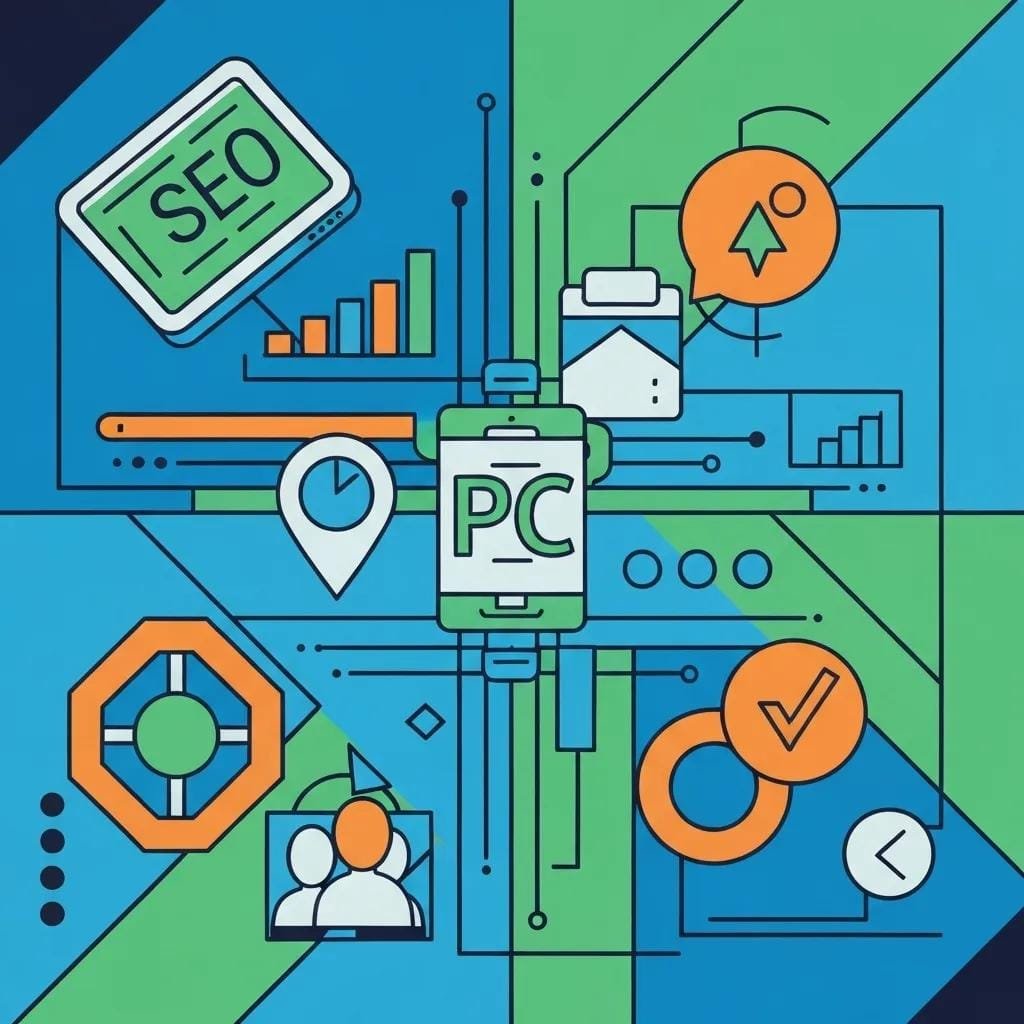
Mastodon's Comprehensive Solutions for Business Growth
Marketing solutions combine strategic planning, targeted tactics, and technology to transform marketing spend into measurable growth and profit. Many businesses struggle with fragmented campaigns, insufficient lead flow, and unclear ROI—wasting resources and momentum. Integrated marketing solutions promise to unify channels, optimize budgets, and drive both brand visibility and sales performance. This guide unpacks seven critical themes: defining marketing solutions and their impact, exploring digital marketing solutions, tailoring approaches for small businesses, leveraging marketing automation, understanding agency offerings, quantifying benefits, and surveying emerging marketing technology trends. By the end, you’ll have a clear roadmap to implement end-to-end marketing solutions that maximize ROI and fuel sustainable growth.
What Are Marketing Solutions and How Do They Drive Business Growth?
Marketing solutions are comprehensive programs that align audience insights, messaging, channels, and analytics to achieve specific business goals. By orchestrating tactics—such as SEO, content production, social media, email, and advertising—these solutions target customer segments with relevant interactions and track performance to refine campaigns continuously. For example, a mid-sized e-commerce brand adopted an integrated marketing solution combining SEO, PPC, and email nurture, resulting in a 35% increase in qualified leads within six months.
Marketing solutions generate brand recognition, accelerate lead generation, and improve conversion rates by connecting strategic planning with execution. When each component aligns around a unified value proposition, businesses capture and nurture prospects through each stage of the buyer’s journey, driving sustained revenue growth.
What Types of Marketing Solutions Are Available?
Marketing solutions span multiple categories to address diverse objectives and channels:
- Digital Marketing Solutions enhance online presence and traffic via SEO, PPC, social media, email, and content marketing.
- Traditional Marketing Solutions include print advertising, direct mail, events, and PR to build offline brand awareness.
- Marketing Automation Solutions use software to automate outreach, lead scoring, and cross-channel workflows.
- Integrated Omni-Channel Solutions unify online and offline touchpoints for consistent messaging and personalization.
Each approach targets specific goals—whether immediate lead capture or long-term brand building—and can be combined into a cohesive solution. Understanding these types sets the stage for choosing the right mix of channels and technologies.
How Do Marketing Solutions Improve Brand Awareness and Lead Generation?
Marketing solutions boost brand awareness and lead generation through coordinated messaging and channel synergy. By optimizing SEO and content marketing, businesses appear prominently for relevant search queries, while PPC campaigns accelerate visibility for high-intent audiences. Simultaneously, social media and email nurture campaigns reinforce messaging, building trust and guiding prospects to conversion. This multi-touch framework ensures consistent branding, drains friction from the customer journey, and delivers a predictable flow of qualified leads to sales teams.
Which Metrics Measure the Success of Marketing Solutions?
Evaluating marketing solutions requires tracking both engagement and revenue impact:
| Metric | Measurement Focus | Insight Gained |
|---|---|---|
| Return on Investment | Revenue generated vs. spend | Overall profitability of marketing investments |
| Customer Acquisition Cost | Total spend ÷ new customers | Efficiency of lead-to-customer conversion |
| Conversion Rate | Actions completed ÷ visits | Effectiveness of landing pages and CTAs |
| Engagement Rate | Likes, shares, opens, clicks | Audience receptivity and content relevance |
| Marketing-Qualified Leads | Leads meeting criteria | Quality of lead generation tactics |
Tracking these metrics enables data-driven optimization, ensuring each marketing solution component contributes to business growth and maximizes ROI.
Marketing solutions lay the conceptual foundation for leveraging digital channels at scale, which we explore next.
What Are Digital Marketing Solutions and Their Key Components?

Digital marketing solutions encompass online tactics and platforms that drive traffic, engagement, and conversion through the web. These solutions rely on search engines, paid advertising, social networks, email platforms, and content ecosystems. For instance, a software provider implemented a full digital marketing solution—blending SEO, PPC, social media, and email automation—to boost trial sign-ups by 50% in four months.
Digital marketing solutions unlock precise targeting, real-time analytics, and scalable outreach, making them essential for modern business growth.
How Does SEO Enhance Online Visibility and Traffic?
Search engine optimization (SEO) improves organic rankings by optimizing website content, architecture, and backlinks to align with user search intent. By researching keywords, crafting authoritative content, and building quality links, SEO drives sustained, cost-effective traffic. A well-executed SEO component increases visibility for high-value queries, delivering a stream of qualified visitors and reducing dependence on paid channels.
What Are the Benefits of PPC Advertising for Immediate Results?
Pay-per-click (PPC) advertising delivers instant visibility by bidding on search keywords or display placements. Advertisers control budgets and target demographics precisely, ensuring ads reach high-intent audiences. Immediate traffic spikes and A/B testing capabilities help refine messaging and landing page performance rapidly. This agile model complements SEO’s long-term gains with quick lead generation and valuable conversion data.
How Do Social Media and Email Marketing Boost Customer Engagement?
Social media and email marketing create direct communication channels for nurturing relationships and reinforcing brand messages.
- Social Media Marketing leverages platforms like LinkedIn, Facebook, and Instagram to spark conversations, share content, and amplify promotions.
- Email Marketing delivers personalized messages, automated journeys, and segmented campaigns to move prospects through the funnel.
- Social-Email Integration synchronizes audience data to deliver consistent messaging across platforms, increasing open rates and social shares.
Together, these components foster ongoing engagement, loyalty, and repeat business, essential for sustained revenue growth.
Why Is Content Marketing Essential for Demand Generation?
Content marketing generates demand by educating, entertaining, and solving prospects’ challenges with blog posts, ebooks, videos, and webinars. High-quality content builds authority, attracts inbound links, and fuels social and email campaigns. As audiences consume valuable insights, trust grows, and lead conversion rates improve. Content marketing anchors digital marketing solutions by providing the substance that SEO, PPC, social media, and email channels distribute and promote.
Digital marketing solutions form a powerful hub for scalable growth; next, we’ll see how small businesses can harness tailored marketing solutions.
How Do Marketing Solutions Cater to Small Businesses?
Small businesses need cost-effective, high-impact marketing solutions that maximize results on limited budgets. By focusing on local targeting, lean automation, and creative content, small organizations can compete with larger players and capture market share. A local café, for example, used a combined local SEO and targeted social ads solution to increase neighborhood foot traffic by 45% in three months.
Tailored marketing solutions empower small businesses to optimize resources, shorten sales cycles, and build loyal communities.
What Are Budget-Friendly Marketing Strategies for Small Businesses?
- Local SEO Optimization refines Google My Business profiles and location-based keywords to capture neighborhood searches.
- Content Repurposing transforms existing content into multiple formats—blog posts, infographics, short videos—to extend reach without extra cost.
- Collaborative Partnerships with complementary local businesses for co-promotions and bundled offers, expanding audience reach organically.
These strategies balance affordability with impact, ensuring small businesses can sustain visibility and lead flow.
How Does Local SEO Help Small Businesses Compete Locally?
Local SEO solutions improve discoverability in geographic searches by optimizing on-page elements, local citations, and customer reviews. Ranking in the local pack on search results pages drives high-intent foot traffic. By consistently managing business listings, responding to reviews, and producing location-specific content, small businesses outrank larger chains in neighborhood searches and strengthen community presence.
What Lead Generation Techniques Work Best for Small Companies?
| Technique | Required Investment | Expected Outcome |
|---|---|---|
| Email Newsletters | Email platform subscription | List growth and recurring engagement |
| Referral Programs | Discount or reward | Word-of-mouth amplification |
| Geo-Targeted Social Ads | Ad spend | Immediate leads from local demographics |
| Micro-Influencer Outreach | Product samples | Authentic endorsements and new audiences |
With small businesses empowered, we turn to automation software as a critical solution for streamlining marketing operations.
What Is Marketing Automation Software and How Does It Streamline Marketing?
Marketing automation software centralizes campaign workflows, automates repetitive tasks, and personalizes communications at scale. By integrating CRM data, email platforms, and analytics, automation platforms orchestrate customer journeys—from initial lead capture to post-purchase follow-up. A B2B services firm, for instance, implemented an automation solution to nurture trial users, boosting conversion by 28% and cutting manual outreach by 60%.
Automation software streamlines marketing by reducing manual effort, shortening response times, and delivering consistent, personalized experiences across channels.
How Does AI Power Marketing Automation for Personalization?
AI in Marketing Automation
AI is transforming marketing by automating tasks, personalizing experiences, and providing data-driven insights. AI-powered tools can analyze data, predict customer behavior, and optimize campaigns in real-time, leading to increased efficiency and improved ROI.
This source highlights the impact of AI on marketing automation, which is a key component of digital marketing solutions.
What Are the Core Features of Marketing Automation Platforms?
- Email Automation to send scheduled and behavior-triggered messages.
- Lead Scoring that assigns grades to prospects based on engagement and fit.
- CRM Integration syncing customer data across sales and marketing teams.
- Multi-Channel Campaigns spanning email, social, SMS, and web.
- Analytics & Reporting offering insights into campaign effectiveness and ROI.
These capabilities converge to automate end-to-end marketing processes, freeing teams to focus on strategy and creative optimization.
How Can Small Businesses Benefit from Marketing Automation?

- Reducing Manual Workload, allowing lean teams to handle more campaigns simultaneously.
- Improving Lead Nurturing, ensuring consistent follow-up and faster response times.
- Providing Data-Driven Insights, guiding budget allocation and content strategy.
- Scaling Personalized Outreach, delivering relevant offers without proportional increases in headcount.
Benefits of Marketing Automation for Small Businesses
Marketing automation tools offer several advantages for small businesses, including improved customer engagement, enhanced efficiency, and cost-effective marketing solutions. These tools help streamline processes, personalize communications, and make data-driven decisions.
This source supports the article’s discussion on how marketing solutions cater to small businesses by providing budget-friendly and impactful strategies.
Having explored automation, we shift to understanding the full spectrum of agency services available to businesses of all sizes.
What Services Do Digital Marketing Agencies Provide?
Digital marketing agencies offer end-to-end services, from strategy and execution to analytics and optimization. Whether as an extension of in-house teams or as standalone partners, agencies deliver specialized expertise that accelerates marketing solution deployment. A retail brand engaged a full-service agency for an omnichannel solution, leading to a 20% lift in e-commerce sales and a 30% increase in email open rates.
Partnering with an agency provides access to multidisciplinary teams, advanced tools, and best practices—driving faster time-to-value for marketing solutions.
What Is Included in Full-Service Digital Marketing Agency Offerings?
- Strategic Planning including market research, audience profiling, and campaign roadmaps.
- Creative Services such as copywriting, design, and video production.
- Paid Media Management overseeing PPC, social, and display ad campaigns.
- Organic Growth through SEO, content marketing, and social engagement.
- Analytics & Reporting to monitor KPIs, attribute performance, and inform optimizations.
This holistic approach ensures all components of a marketing solution work in harmony to achieve business objectives.
How Do Specialized Agency Services Enhance Marketing Results?
Specialized agencies focus on discrete disciplines—such as SEO, PPC, or influencer marketing—to deliver deep expertise and advanced tactics. An SEO-focused agency, for example, can conduct site audits, implement technical fixes, and build high-authority link profiles far more efficiently than generalist teams. By complementing full-service offerings with niche specialists, businesses gain the precision and innovation needed to outpace competitors in specific channels.
When Should Businesses Consider Marketing Consulting Services?
- They need an objective assessment of existing strategies.
- They require guidance on technology selection and integration.
- They want to develop a long-term roadmap for scaling marketing solutions.
Consultants provide expert recommendations, process frameworks, and implementation plans that set the stage for successful, sustainable marketing operations.
What Are the Key Benefits of Implementing Marketing Solutions?
Integrated marketing solutions unlock multiple value drivers: enhanced customer experiences, efficient resource utilization, and measurable financial returns. By connecting channels and unifying data, businesses deliver cohesive journeys that delight prospects and customers, leading to higher retention, larger deal sizes, and predictable revenue growth. Organizations adopting comprehensive solutions often see a 3× increase in marketing efficiency and up to 544% average ROI within the first year of implementation.
These advantages underscore why cohesive marketing solutions are critical for scaling businesses and maximizing return on investment.
How Do Integrated Marketing Solutions Improve Customer Experience?
Integrated marketing solutions create seamless, personalized experiences across channels. By aligning messaging, timing, and content based on customer behavior and preferences, organizations reduce friction and increase relevance at every touchpoint. Consistent branding and context-aware communications strengthen trust and engagement, ultimately boosting lifetime customer value and loyalty.
What ROI Can Businesses Expect from Marketing Automation and Digital Strategies?
| Strategy Combination | Average ROI | Timeframe |
|---|---|---|
| Automation + Email Marketing | 544% | 12 months |
| SEO + Content Marketing | 300% | 6–9 months |
| PPC + Conversion Rate Optimization | 150% | 3–6 months |
These statistics demonstrate how targeted investments in integrated marketing solutions translate into rapid and sustained financial impact.
How Do Marketing Solutions Help Solve Common Business Challenges?
- Predictable Lead Pipelines through coordinated multi-channel campaigns.
- Lower Acquisition Costs by optimizing spend across channels and automating routine tasks.
- Data-Driven Decision-Making from unified analytics that measure customer journeys end to end.
Solving these issues builds operational efficiency and empowers teams to focus on growth rather than firefighting.
What Are the Latest Marketing Technology Trends Impacting Solutions?
Emerging marketing technologies—such as AI, omnichannel platforms, advanced analytics, and mobile optimization—are redefining how solutions are designed and executed. Businesses adopting these trends gain deeper customer insights, faster campaign iterations, and improved ROI. For example, AI-powered personalization engines and chatbots have increased engagement rates by over 25% in early adopters.
Embracing these innovations is essential to future-proof marketing solutions and maintain competitive advantage.
How Is Artificial Intelligence Transforming Marketing Solutions?
AI transforms marketing solutions by automating complex tasks and delivering real-time personalization. Machine learning algorithms analyze vast datasets to predict customer intent, recommend content, and optimize bids in advertising auctions. AI chatbots handle initial inquiries instantly, while predictive lead scoring prioritizes high-value prospects—enhancing both efficiency and conversion performance.
What Role Does Omnichannel Marketing Play in Customer Retention?
Omnichannel marketing solutions integrate messaging and experiences across online and offline touchpoints—such as websites, mobile apps, email, social, and in-store interactions. This unified approach ensures customers receive consistent, relevant communications that reflect their past behavior and preferences. Organizations employing omnichannel strategies retain up to 89% of customers, compared to 33% when channels operate in isolation.
Omnichannel Marketing and Customer Retention
Companies with strong omnichannel customer engagement retain a significantly higher percentage of customers compared to those with weak strategies. Omnichannel strategies create a cohesive shopping experience, leading to higher retention rates and improved customer satisfaction.
This source supports the article’s discussion on the benefits of integrated marketing solutions, particularly in improving customer experience and retention.
How Are Analytics and Data-Driven Insights Enhancing Marketing Performance?
Advanced analytics platforms collect and process data from every customer interaction, providing actionable insights into campaign effectiveness, customer sentiment, and revenue attribution. Real-time dashboards and predictive models enable marketers to pivot strategies quickly, allocate budget to high-performing channels, and forecast future demand—driving continuous improvement and higher marketing ROI.
Why Is Mobile-First Optimization Critical for Marketing Success?
With over 60% of global web traffic coming from mobile devices, mobile-first optimization ensures campaigns and content render seamlessly on smartphones and tablets. Responsive design, accelerated mobile pages (AMP), and mobile UX enhancements reduce load times and friction, increasing engagement and conversion rates. Prioritizing mobile in every marketing solution meets customers where they are and maximizes reach and effectiveness.
Adopting comprehensive marketing solutions—from foundational definitions to cutting-edge trends—empowers businesses to align strategy, technology, and analytics for sustained growth. By choosing the right mix of digital tactics, automation tools, agency expertise, and emerging technologies, organizations maximize ROI, strengthen customer experiences, and solve core growth challenges. Implementing these solutions with a data-driven mindset and continuous optimization closes the gap between marketing spend and revenue impact, setting the stage for long-term success.



